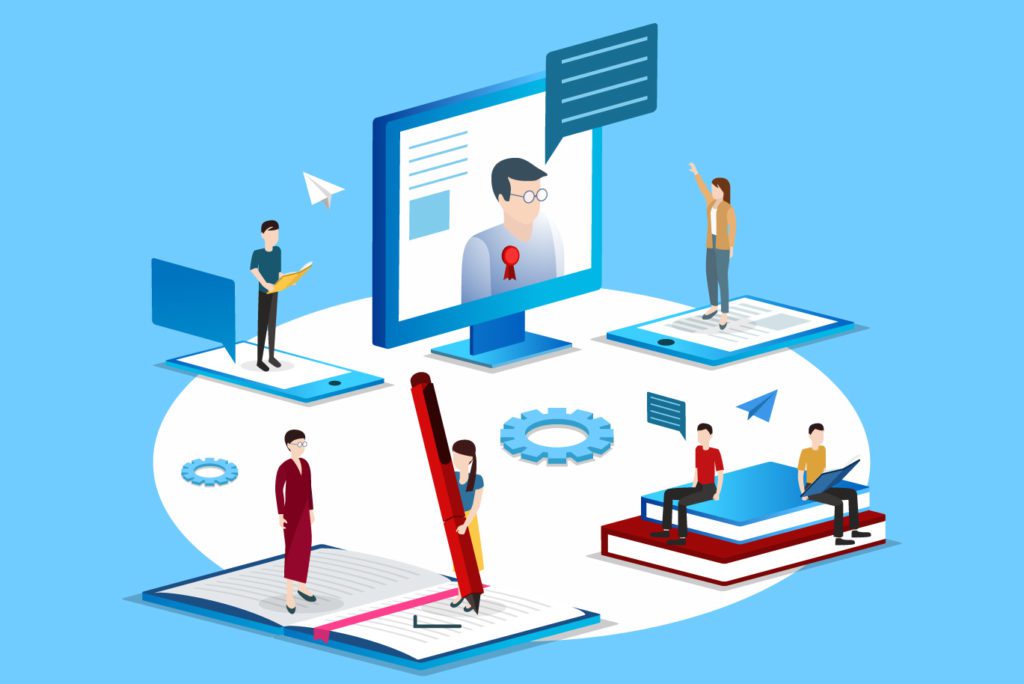In this world of digital collaboration, working together and getting connected is a matter of a few clicks. While technology continues to redefine the way we live and work, it is also changing the way we learn. The importance of digital collaboration in classroom is tremendous, from getting connected to working together seamlessly. It has helped us in many ways. Let us dive deep into the benefits of digital collaboration in classroom and understand what else it has to offer.
What is digital collaboration?

Digital collaboration is the use of digital tools and technology to indulge and exchange information. It is beneficial because it allows students to engage in collaborative learning, which can help them develop their critical thinking, communication, and problem-solving skills.
Students are also better equipped for the demands of today’s workforce, where remote work and virtual collaboration are increasingly common.
Know everything you need to know about Digital Classrooms!
Benefits of digital collaboration in classroom
Digital collaboration in classroom has many advantages for both teachers and students. It enables students to participate in collaborative learning, work on group projects together, and share knowledge and ideas.
Whereas, teachers can employ digital collaboration tools to make the learning environment more engaging and dynamic. Let us discuss some of the benefits of digital collaboration in classroom.
1. Increased participation
Digital collaboration in classroom provides students with a platform where they can openly discuss and share their ideas and opinions with each other. With the help of digital collaboration there is a flow of information in the classroom.
- Helps in encouraging student’s participation
- Promotes classroom discussion
- Allows students to collaborate with each other to finish assigned tasks and assignments
- Students get a better platform to express their ideas and opinions with each other
- Encourages students’ active participation and discussion
2. More efficient communication
Digital collaboration tools help in providing easy communication between teachers and students. It acts as a bridge between them to have access to easy and smooth communication. Teachers can also use digital collaboration platforms to share any important announcements or assignments with their students.
Suggested – Tips For Teachers To Improve Communication Skills
- Promotes communication between teacher and students
- There is no need for face to face encounters
- Reduces travel time
3. Improved critical thinking abilities
Digital collaboration in classroom helps students to think differently. It provides them a platform to explore diverse perspectives during the learning process. With the collaborative learning approach, teachers and students can think out of the box.
- Students think more creatively
- Helps in the development of problem solving and decision making skills
- It also promotes individual thinking ability
- It encourages kids to think beyond their own experiences
4. Possibility for a variety of viewpoints
Digital collaboration in classroom fosters a more inclusive learning environment that appreciates variety and encourages cross-cultural dialogue and collaboration by giving a space for varied perspectives. It is a great way to work together effectively and efficiently.
- Students and teachers from different backgrounds can collaborate with each other
- Helps in promoting diversity of thoughts and ideas
- Cultural and social viewpoints are encouraged within the classroom premises
- In the classroom, it promotes empathy and understanding
Strategies for implementing digital collaboration

1. Choose the right digital collaboration tools
Teachers should select the digital collaboration tools which will be appropriate for their students’ requirements and align with their learning objectives. While choosing the tool ensure that it is user friendly, reliable, secure and easily accessible.
2. Create a collaborative learning environment
A collaborative learning environment that helps to encourage students to work together and share knowledge is important. Teachers can set clear guidelines for communication and collaboration, and encourage active participation in the classroom.
3. Provide training and support
It is important for both students and teachers to effectively use digital collaboration tools. With proper training and support it will become easier for teachers and students to use technical tools and include them in the learning process.
4. Set clear learning objectives
You can set specific learning goals and expectations for collaborative activities. This can help students stay engaged and motivated while also ensuring that they meet the learning objectives.
5. Structured class activities
Indulging in class activities will help students collaborate with each other. Include group activities in your class plans, as well as collaborative projects that require students to collaborate. Encourage students to take on diverse responsibilities within the group, and allow for peer input and evaluation.
Challenges of digital collaboration in classroom
1. Technical issues
This is the most common issue faced by teachers and students during collaborative learning approach in the classroom. These difficulties can interfere in the learning process and cause delays. Other major problems could be network issues, connectivity issues, equipment malfunctioning, software incompatibility etc.
2. Lack of student participation
Teachers face a lot of issues regarding student participation during the process of digital collaboration in classroom. Due to lack of face to face interaction students and teachers find it difficult to open up with each other. It leads to difficulty in building relationships, decreased socialization between students and teachers etc.
3. Security and privacy issues
While using digital collaboration tools, teachers and students are aware of cyber crimes. Such as hacking, malware etc. Sometimes they share important and sensitive information with each other which can compromise personal information.
Conclusion
To conclude, digital collaboration in classroom has become a crucial component of modern education since it fosters teamwork, critical thinking, and problem-solving abilities. Teachers can benefit from digital collaboration tools and platforms by improving their learning experience.
There are several difficulties which teachers and students might face but the benefits of having a collaborative learning environment are obvious. So, let us embrace digital cooperation and provide our children with the skills they need to prosper in a quickly changing world!
Moreover, if you are passionate about teaching and wish to build a brand of your coaching business then Classplus is here to help. Get your coaching app where you can easily connect with students, assign tests, create assignments, broadcast important announcements etc. To know more, connect with our growth experts and take a FREE demo now!
Importance of Digital Collaboration in Classroom FAQs
A1. It helps in enhancing communication, fosters collaboration, promotes creativity, encourages student participation etc.
A2. There are many digital collaboration tools, such as video conferencing platforms, online discussion forums, cloud-based storage and sharing platforms, and virtual whiteboards.
A3. Yes, by following proper strategies and implementation you can use digital collaboration in classroom.
A4. Teachers can provide technical support to their students, ensure face to face interaction, support digital literacy etc. to overcome the challenges of collaborative learning approach.



